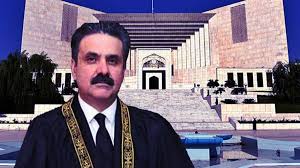Chief Justice of Pakistan Yahya Afridi has brought national attention to a critical pillar of the justice system: the district judiciary. In a significant move toward overhauling the country’s legal landscape, he has called for meaningful and targeted reforms focused on empowering district courts, declaring them the true foundation upon which the country’s justice delivery must stand.
District courts are often the first and only point of contact between the ordinary citizen and the judicial system. Despite this, for decades they have remained under-resourced, overburdened, and structurally outdated. This disconnect between the frontline of justice and the reform narratives emerging from higher courts has widened the gap between citizens and the judicial process. Chief Justice Afridi has now identified this as a fundamental challenge and a top priority for institutional transformation.
In a high-level discussion with judicial stakeholders, Chief Justice Afridi emphasized that no amount of reform at the higher levels of the judiciary can succeed unless the district courts are strengthened from the ground up. He pointed out that the performance, accessibility, and credibility of the entire justice system ultimately depend on the effectiveness of the district courts. They are the courts where the common man brings grievances, seeks redress, and places faith in the rule of law.
A major part of his reform vision includes the development of modern, citizen-centric judicial infrastructure. He underscored the need to design court complexes that prioritize public accessibility, safety, cost-efficiency, and functionality. The objective is to move away from ad-hoc, cramped courtrooms toward purpose-built facilities that reflect the dignity and seriousness of judicial proceedings. For litigants and lawyers alike, this means better waiting areas, safer environments, more organized courtrooms, and easier access through improved transport connectivity.
An ambitious example of this vision is the proposed judicial complex that will house over 100 courts within a single site. This initiative aims to centralize judicial services and improve operational efficiency, while also offering state-of-the-art amenities for court users, including digital filing systems, e-hearings, and centralized help desks. Such a model is not just about infrastructure it is about signaling a shift in how justice is seen, delivered, and experienced by the public.
However, Chief Justice Afridi has made it clear that infrastructure alone is not enough. He firmly believes that collaboration between the judiciary, bar councils, and government bodies is essential. Judicial reform must be the result of deep and sustained consultation with those who are engaged with the system on a daily basis—judges, lawyers, court staff, and most importantly, citizens. Reform should not be imposed from the top down, but rather shaped through consensus and reflective of real-world needs.
He also highlighted the importance of working alongside the legal fraternity, calling them a vital partner in this transformation journey. The Bar plays a pivotal role not just in advocacy, but in shaping legal culture, ensuring ethical standards, and mentoring future generations of legal professionals. Strengthening professional development, improving bar associations’ facilities, and fostering trust between bench and bar are key elements of the reform agenda.
Another cornerstone of his strategy includes the promotion of alternate dispute resolution mechanisms such as court-annexed mediation. By integrating such systems at the district level, the judiciary can reduce caseloads, expedite resolutions, and offer parties more amicable and cost-effective solutions. Complementary initiatives like fixed timelines for criminal and civil trials, performance monitoring of judges, digitalization of records, and solar-powered courts further reinforce the move toward a more modern and accountable judiciary.
Chief Justice Afridi’s call to action is not just an administrative suggestion it is a transformative vision. He is advocating for a justice system that is rooted in accessibility, fairness, and efficiency. By putting the spotlight on the district courts, he is empowering the very foundation of Pakistan’s legal structure to evolve into a more responsive and inclusive institution.
In a country where justice is often seen as delayed or denied due to procedural complexities and outdated court systems, this renewed focus on district courts offers hope for real change. The implementation of these reforms has the potential to redefine the citizen’s relationship with the state, restore faith in the judicial process, and ultimately, contribute to a more just society.
If effectively executed, these initiatives will not only streamline judicial operations but also reinforce the principle that justice must begin where it is most urgently needed at the doorstep of the people. Through practical steps and visionary leadership, Chief Justice Afridi is laying down the path for a reimagined judicial future one that is truly by the people, for the people.



Comments (0)
No comments yet. Be the first to comment!
Leave a Comment